The global AI-integrated blood analyzers market is projected to grow from USD 2,805.7 million in 2025 to approximately USD 19,348.6 million by 2035, recording an absolute increase of USD 16,542.9 million over the forecast period. This translates into a total growth of 589.7%, with the market forecast to expand at a compound annual growth rate (CAGR) of 21.3% between 2025 and 2035. The overall market size is expected to grow by nearly 6.9X during the same period, supported by increasing demand for precision diagnostics, growing adoption of artificial intelligence in healthcare, and rising focus on personalized medicine and automated laboratory solutions.
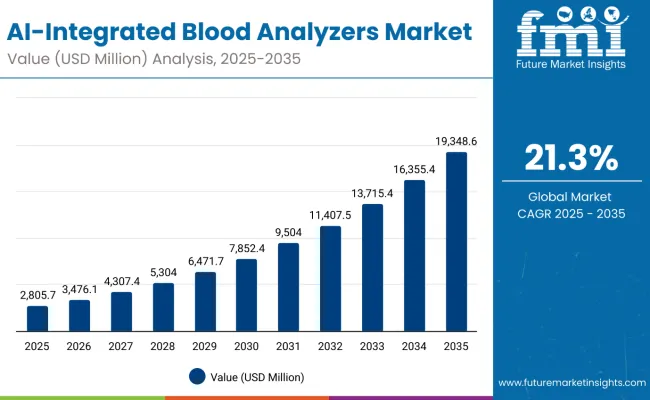
AI-Integrated Blood Analyzers Market Key Takeaways
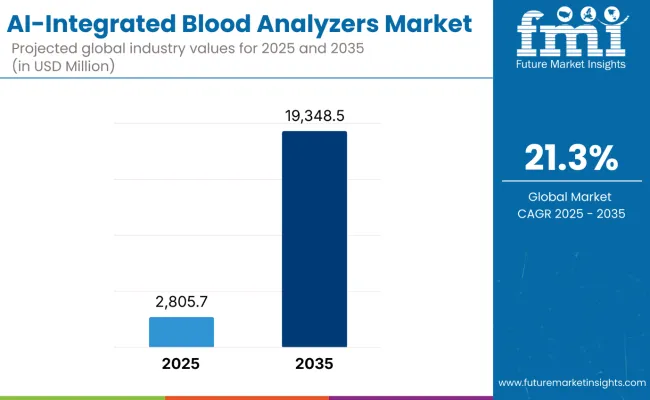
| Metric | Value |
|---|---|
| Estimated Value in (2025E) | USD 2,805.7 million |
| Forecast Value in (2035F) | USD 19,348.6 million |
| Forecast CAGR (2025 to 2035) | 21.3% |
Between 2025 and 2030, the AI-integrated blood analyzers market is projected to expand from USD 2,805.7 million to USD 7,542.1 million, resulting in a value increase of USD 4,736.4 million, which represents 28.6% of the total forecast growth for the decade. This phase of growth will be shaped by rising awareness about AI-powered diagnostic solutions, increasing demand for automated laboratory workflows, and growing penetration of intelligent analyzers in emerging markets. Healthcare technology companies are expanding their AI-integrated blood analyzer portfolios to address the growing demand for accurate and efficient diagnostic solutions for complex medical conditions.
From 2030 to 2035, the market is forecast to grow from USD 7,542.1 million to USD 19,348.6 million, adding another USD 11,806.5 million, which constitutes 71.4% of the overall ten-year expansion. This period is expected to be characterized by expansion of AI-powered diagnostic capabilities, integration of machine learning algorithms with blood analysis platforms, and development of personalized diagnostic protocols. The growing adoption of precision medicine and healthcare provider recommendations will drive demand for clinically validated AI-integrated blood analyzers with enhanced accuracy and predictive capabilities.
Between 2020 and 2025, the AI-integrated blood analyzers market experienced rapid expansion, driven by increasing recognition of artificial intelligence benefits in diagnostic accuracy and growing acceptance of automated laboratory solutions. The market developed as healthcare providers recognized the need for intelligent diagnostic tools to address complex medical conditions and improve patient outcomes. Clinical research and regulatory approvals began emphasizing the importance of AI integration in achieving better diagnostic precision for challenging laboratory testing scenarios.
Market expansion is being supported by the increasing demand for precision diagnostics and the corresponding need for more accurate and efficient analytical approaches. Modern healthcare providers are increasingly focused on AI-powered solutions that can enhance diagnostic accuracy, reduce human error, and improve laboratory workflow efficiency. The proven effectiveness of artificial intelligence in blood analysis for detecting complex conditions like cancer, cardiovascular disease, and infectious diseases makes them essential components of comprehensive diagnostic strategies.
The growing emphasis on personalized medicine and precision healthcare is driving demand for tailored diagnostic solutions that address individual patient needs and genetic profiles. Healthcare provider preference for automated systems that combine artificial intelligence with traditional blood analysis capabilities is creating opportunities for innovative product development. The rising influence of clinical guidelines and evidence-based diagnostic protocols is also contributing to increased adoption of proven AI-integrated blood analyzers across different healthcare settings and diagnostic applications.
The market is segmented by product type, application, technology, and region. By product type, the market is divided into AI-integrated blood analyzers, AI-assisted POC analyzers, AI-based test report automation tools, and AI-based diagnostic software. Based on application, the market is categorized into oncology, cardiovascular disease, infectious disease, hematology, metabolic & endocrine disorders, autoimmune & inflammatory conditions, neurological disorders, prenatal & neonatal testing, and wellness & preventive health. In terms of technology, the market is segmented into diagnostic laboratories, hospitals & clinics, point-of-care settings, academic & research institutes, corporate wellness providers, and others. Regionally, the market is divided into North America, Europe, East Asia, South Asia & Pacific, Latin America, and Middle East & Africa.
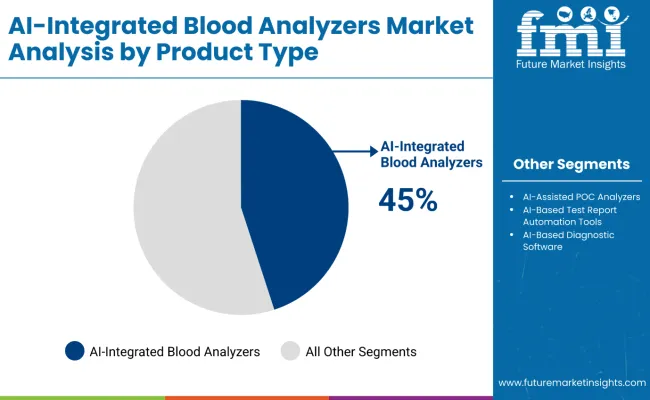
The AI-integrated blood analyzers segment is projected to account for 45.0% of the AI-integrated blood analyzers market in 2025, reaffirming its position as the category's dominant product type. Healthcare providers increasingly recognize the superior capabilities of fully integrated AI-powered blood analysis systems for comprehensive diagnostic workflows, particularly in high-throughput laboratory environments and specialized diagnostic applications. This product type addresses both analytical precision and operational efficiency, providing comprehensive diagnostic coverage.
This product segment forms the foundation of most advanced diagnostic protocols for complex medical conditions, as it represents the most technologically sophisticated and clinically validated approach in modern laboratory medicine. Regulatory approvals and extensive clinical research continue to strengthen confidence in these advanced systems. With increasing recognition of the complexity of diagnostic requirements demanding intelligent analytical approaches, AI-integrated blood analyzers align with both immediate diagnostic needs and long-term healthcare automation goals. Their broad applicability across multiple medical specialties ensures sustained market dominance, making them the central growth driver of intelligent diagnostic demand.
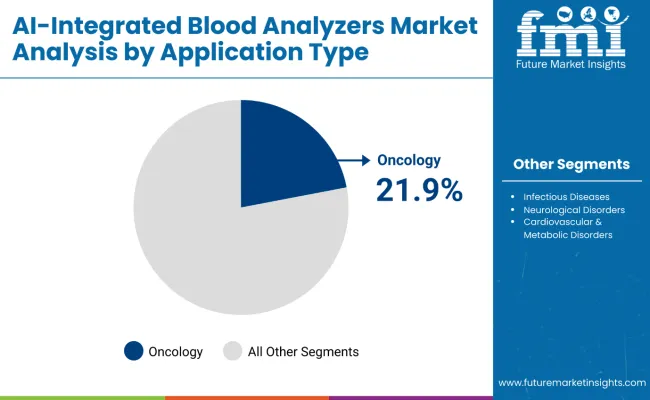
Oncology is projected to represent 21.9% of AI-integrated blood analyzers demand in 2025, underscoring its role as the primary application driving AI-powered diagnostic adoption. Healthcare providers recognize that cancer detection and monitoring requires sophisticated analytical capabilities that traditional blood analysis methods cannot adequately provide. AI-integrated systems offer enhanced sensitivity in detecting cancer biomarkers, monitoring treatment response, and predicting disease progression.
The segment is supported by the critical nature of cancer diagnosis requiring precise analytical capabilities and the growing recognition that AI-powered approaches can improve early detection rates and patient outcomes. Additionally, healthcare systems are increasingly adopting evidence-based diagnostic guidelines that recommend specific AI-integrated analyzers for optimal cancer screening and monitoring. As clinical understanding of cancer biomarkers advances, AI-integrated blood analyzers will continue to play a crucial role in comprehensive oncology care strategies, reinforcing their essential position within the diagnostic market.
The diagnostic laboratories segment is forecasted to contribute 42.1% of the AI-integrated blood analyzers market in 2025, reflecting the primary role of centralized laboratories in advanced diagnostic testing and AI-powered analysis. Healthcare systems rely on sophisticated laboratory infrastructure for high-volume, precision diagnostic services, making diagnostic laboratories the cornerstone of AI-integrated blood analyzer utilization. This segment provides essential services including complex biomarker analysis, predictive diagnostics, and coordination with healthcare providers.
The segment benefits from established laboratory networks and specialized technical expertise required for AI-powered diagnostic systems. Diagnostic laboratories also offer advantages in terms of economies of scale, specialized equipment maintenance, and comprehensive quality control systems. With growing emphasis on precision medicine and AI-powered healthcare solutions, diagnostic laboratories serve as critical implementation points for AI-integrated blood analyzers, making them fundamental drivers of market accessibility and technological advancement.
The AI-integrated blood analyzers market is advancing rapidly due to increasing recognition of artificial intelligence benefits in diagnostic accuracy and growing demand for automated laboratory solutions. However, the market faces challenges including complex regulatory pathways, high implementation costs, and concerns about data privacy and algorithm validation. Innovation in AI algorithms and integration with existing laboratory systems continue to influence product development and market expansion patterns.
Expansion of Point-of-Care Testing and Decentralized Diagnostics
The growing adoption of point-of-care testing facilities is enabling more accessible AI-powered diagnostic capabilities and real-time analysis. POC settings offer immediate diagnostic results with AI-enhanced accuracy, including rapid biomarker detection and instant clinical decision support. Decentralized diagnostic channels provide access to AI-powered analysis in remote healthcare settings where traditional laboratory infrastructure may be limited.
Integration of Machine Learning Platforms and Predictive Analytics
Modern diagnostic companies are incorporating advanced machine learning technologies such as deep learning algorithms, predictive modeling systems, and real-time data analytics to enhance blood analysis capabilities. These technologies improve diagnostic accuracy, enable early disease detection, and provide better clinical decision support for healthcare providers. Advanced AI platforms also enable personalized diagnostic recommendations and continuous learning from diagnostic patterns and patient outcomes.
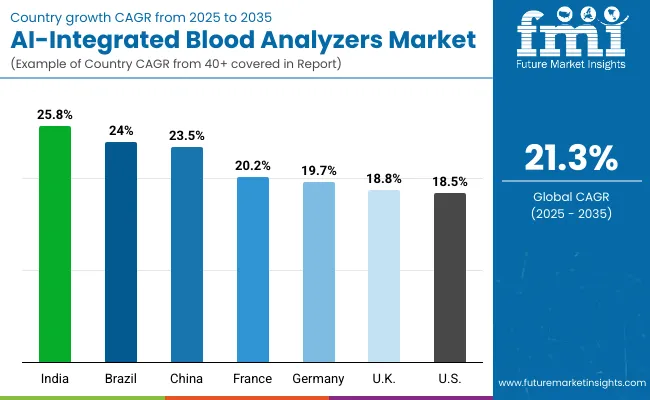
| Countries | CAGR (2025 to 2035) |
|---|---|
| India | 25.8% |
| China | 23.5% |
| Brazil | 24.0% |
| USA | 18.5% |
| France | 20.2% |
| UK | 18.8% |
| Germany | 19.7% |
The AI-integrated blood analyzers market is experiencing exceptional growth globally, with India leading at a 25.8% CAGR through 2035, driven by expanding healthcare infrastructure, increasing adoption of AI technologies, and growing demand for precision diagnostics. China follows at 23.5%, supported by healthcare modernization initiatives, government investment in AI healthcare solutions, and expanding diagnostic capabilities. Brazil shows growth at 24.0%, emphasizing improved access to advanced diagnostic technologies and AI-powered healthcare solutions. Europe records 18.6% growth, focusing on regulatory-compliant AI integration and comprehensive healthcare system modernization. The U.S. shows 18.5% growth, representing a mature market with established AI adoption patterns and advanced regulatory frameworks.
The report covers an in-depth analysis of 40+ countries; seven top-performing countries are highlighted below.
Revenue from AI-integrated blood analyzers in China is projected to exhibit robust growth with a CAGR of 23.5% through 2035, driven by government initiatives supporting AI healthcare development and increasing investment in diagnostic technology modernization. The country's rapidly expanding healthcare infrastructure and growing availability of AI-powered diagnostic services are creating significant opportunities for advanced blood analyzer adoption. Major international and domestic technology companies are establishing comprehensive distribution networks to serve the growing population of healthcare facilities requiring intelligent diagnostic solutions across urban and developing regions.
Revenue from AI-integrated blood analyzers in India is expanding at a CAGR of 25.8%, supported by increasing healthcare digitization, growing awareness of AI benefits in diagnostics, and expanding medical technology market presence. The country's large patient population and increasing investment in healthcare infrastructure are driving demand for efficient AI-powered diagnostic solutions. International technology companies and domestic manufacturers are establishing distribution channels to serve the growing demand for advanced diagnostic equipment.
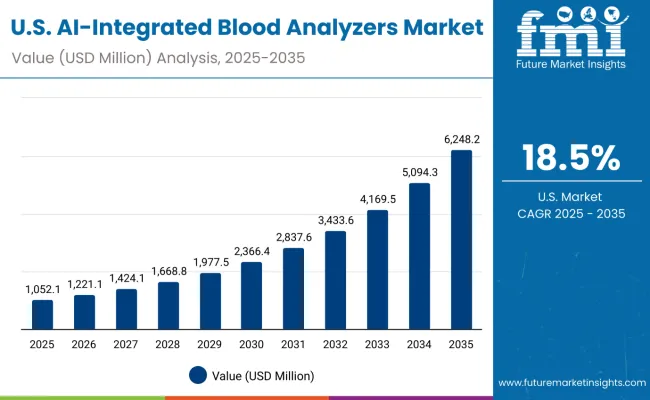
Demand for AI-integrated blood analyzers in the USA is projected to grow at a CAGR of 18.5%, supported by well-established healthcare technology infrastructure and comprehensive AI adoption strategies. American healthcare providers consistently utilize AI-powered diagnostic solutions for complex medical conditions and precision medicine applications. The market is characterized by mature technology adoption patterns, comprehensive regulatory frameworks, and established relationships between healthcare providers and technology companies.
Revenue from AI-integrated blood analyzers in Brazil is projected to grow at a CAGR of 24.0% through 2035, driven by healthcare system modernization, increasing access to advanced diagnostic technologies, and growing recognition of AI benefits in medical diagnostics. Brazilian healthcare providers are increasingly adopting AI-powered diagnostic approaches for complex medical conditions, supported by expanding technology market presence and improved healthcare accessibility.
Revenue from AI-integrated blood analyzers in the UK is projected to grow at a CAGR of 18.8% through 2035, supported by the National Health Service digital health initiatives and comprehensive technology adoption guidelines that facilitate appropriate use of AI-powered diagnostic systems for advanced medical analysis. British healthcare providers consistently utilize established protocols for AI-integrated analyzer implementation, emphasizing patient outcomes and diagnostic excellence within integrated healthcare systems.
Revenue from AI-integrated blood analyzers in Germany is projected to grow at a CAGR of 19.7% through 2035, supported by the country's well-established healthcare technology infrastructure, comprehensive regulatory oversight, and systematic approach to AI medical device adoption. German healthcare providers emphasize evidence-based AI integration within structured healthcare frameworks that prioritize clinical effectiveness and patient safety.
Revenue from AI-integrated blood analyzers in France is projected to grow at a CAGR of 20.2% through 2035, supported by the country's comprehensive healthcare system, established diagnostic infrastructure, and systematic approach to healthcare technology adoption. French healthcare providers emphasize evidence-based AI integration within comprehensive care frameworks that prioritize diagnostic accuracy and treatment optimization.
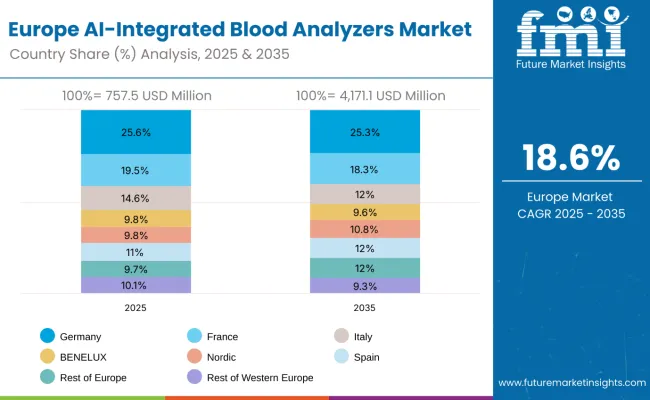
The AI-integrated blood analyzers market in Europe is projected to expand robustly through 2035, supported by increasing adoption of artificial intelligence in diagnostic laboratories, rising prevalence of complex diseases requiring precision diagnostics, and ongoing clinical innovation in AI-powered analytical technologies. Germany will continue to lead the regional market, accounting for 25.6% in 2025 and slightly decreasing to 25.3% by 2035, supported by strong clinical research infrastructure, comprehensive regulatory frameworks, and robust healthcare technology adoption. The United Kingdom follows with 18.3% in 2025, maintaining its position, driven by NHS digital health initiatives, AI medical device integration, and expanding diagnostic networks.
France holds 19.5% in 2025, edging down to 18.3% by 2035 as other markets accelerate adoption of AI-powered diagnostic protocols and demand grows for intelligent analytical systems. Italy contributes 14.6% in 2025, decreasing to 12.0% by 2035, as larger markets capture greater investment in AI healthcare technologies. Spain represents 11.0% in 2025, increasing to 12.0% by 2035, supported by healthcare system modernization and growing AI adoption programs.
BENELUX markets together account for 9.8% in 2025, remaining stable at 9.6% by 2035, supported by innovation-friendly regulatory environments and strong academic-industry collaboration in AI healthcare. The Nordic countries represent 9.8% in 2025, increasing to 10.8% by 2035, with demand fueled by progressive healthcare systems and early adoption of AI-powered diagnostic technologies. The Rest of Western Europe moderates from 9.7% in 2025 to 12.0% by 2035, reflecting growing investment and adoption of AI diagnostic solutions across emerging European markets.
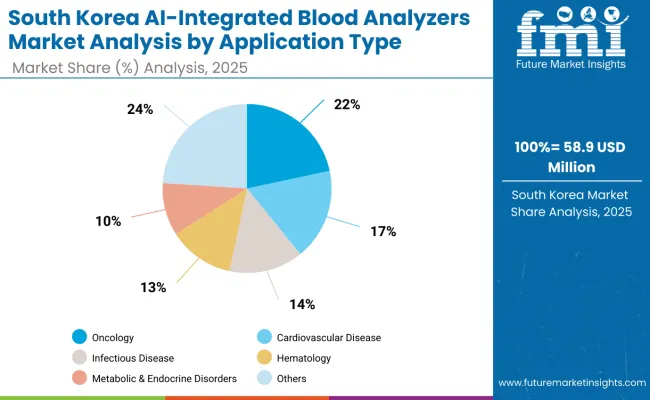
The AI-integrated blood analyzers market in South Korea is set to remain diversified across several product categories in 2025, reflecting clinical preferences in diagnostic practice and evolving technology adoption patterns. AI-Integrated Blood Analyzers dominate with a 42.0% share in 2025, supported by their central role in high-volume diagnostic laboratories, comprehensive medical facilities, and precision medicine applications.
AI-Assisted POC Analyzers represent 28.2% in 2025, gaining traction from increasing point-of-care testing adoption and demand for decentralized diagnostic capabilities. AI-Based Test Report Automation Tools hold 15.1%, sustained by their widespread use in laboratory workflow optimization and administrative efficiency improvements.
Meanwhile, AI-Based Diagnostic Software accounts for 14.7%, driven by increasing integration with existing laboratory information systems and growing demand for intelligent data analytics solutions. The remaining segments reflect the growing role of specialized AI applications and emerging technologies entering clinical diagnostic practice across China's rapidly expanding healthcare system.
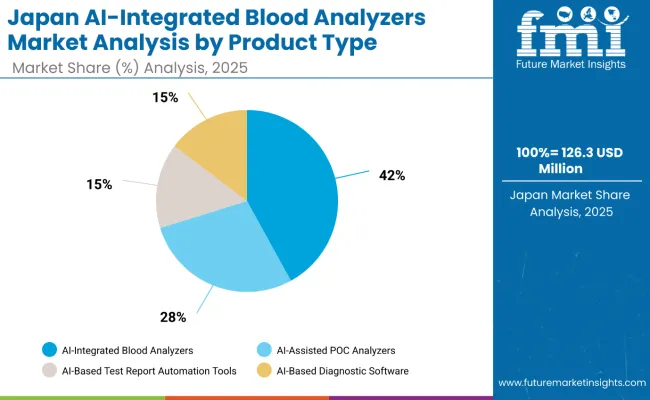
The AI-integrated blood analyzers market in Japan in 2025 is shaped by strong demand across core diagnostic applications, reflecting both clinical prevalence and healthcare modernization initiatives. Oncology accounts for the largest share at 21.7%, supported by increasing cancer screening programs, growing awareness of early detection benefits, and expanding access to advanced diagnostic technologies.
Cardiovascular Disease follows with 17.5%, driven by the rising burden of heart disease, heightened health awareness, and wider availability of AI-powered cardiac biomarker analysis. Infectious Disease contributes 14.2%, supported by the established need for rapid and accurate pathogen detection and growing adoption of AI-enhanced diagnostic protocols.
Hematology holds 12.6%, reflecting growing utilization of AI-powered blood cell analysis and automated hematological assessments. The remaining segments including metabolic disorders, autoimmune conditions, and neurological applications represent emerging opportunities for AI-integrated diagnostic expansion, highlighting the potential for pipeline technologies and broader clinical adoption across India's evolving healthcare landscape.
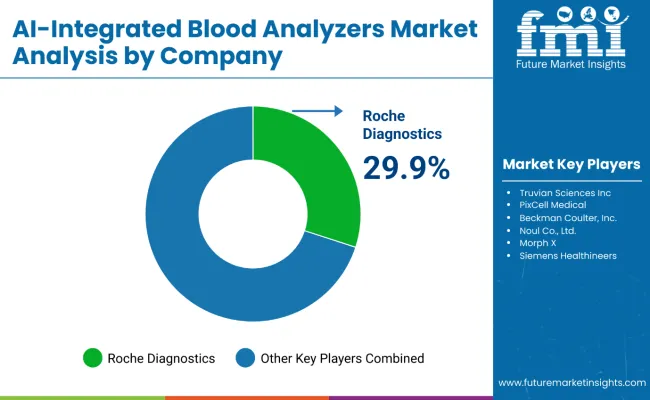
The AI-integrated blood analyzers market is characterized by competition among established diagnostic equipment manufacturers, AI technology companies, and specialized healthcare technology firms. Companies are investing in artificial intelligence research, regulatory compliance, strategic partnerships, and healthcare provider education to deliver effective, accurate, and accessible AI-powered diagnostic solutions. Technology development, clinical validation, and market access strategies are central to strengthening product portfolios and market presence.
Roche Diagnostics, Switzerland-based, leads the market with 29.9% global value share, offering clinically-proven AI-integrated blood analyzers with focus on diagnostic accuracy and comprehensive healthcare solutions. Truvian Sciences Inc provides innovative point-of-care AI-powered analyzers with emphasis on accessibility and rapid results. PixCell Medical focuses on advanced AI algorithms and specialized imaging technologies for blood analysis applications. Beckman Coulter Inc. delivers established diagnostic platforms with integrated AI capabilities and strong healthcare provider acceptance.
Noul Co. Ltd. operates with focus on innovative AI-powered diagnostic solutions for diverse medical applications. Morph X provides comprehensive AI-based diagnostic software and automation tools across multiple healthcare settings. Siemens Healthineers offers integrated healthcare technology solutions including AI-powered blood analysis systems. Shenzhen Dymind Biotechnology Co. LTD specializes in AI-enhanced diagnostic equipment with focus on Asian markets. Sysmex Corporation and Guardant Health provide specialized diagnostic solutions and liquid biopsy technologies to enhance market accessibility and advanced diagnostic capabilities.
Key Players in the AI-Integrated Blood Analyzers Market
| Items | Values |
|---|---|
| Quantitative Units (2025) | USD 2,805.7 Million |
| Product Type | AI-Integrated Blood Analyzers , AI-Assisted POC Analyzers , AI-Based Test Report Automation Tools, AI-Based Diagnostic Software |
| Application | Oncology, Cardiovascular Disease, Infectious Disease, Hematology , Metabolic & Endocrine Disorders, Autoimmune & Inflammatory Conditions, Neurological Disorders, Prenatal & Neonatal Testing, Wellness & Preventive Health |
| Technology | Diagnostic Laboratories, Hospitals & Clinics, Point-of-Care Settings, Academic & Research Institutes, Corporate Wellness Providers, Others |
| Regions Covered | North America, Europe, East Asia, South Asia & Pacific, Latin America, Middle East & Africa |
| Countries Covered | United States, Canada, United Kingdom, Germany, France, China, Japan, South Korea, India, Brazil, Australia and 40+ countries |
| Key Companies Profiled | Roche Diagnostics, Truvian Sciences Inc , PixCell Medical, Beckman Coulter Inc., Noul Co. Ltd., Morph X, Siemens Healthineers , Shenzhen Dymind Biotechnology Co. LTD, Sysmex Corporation, Guardant Health |
| Additional Attributes | Dollar sales by product type and application, regional technology adoption trends, competitive landscape, healthcare provider preferences for specific AI solutions, integration with laboratory information systems, innovations in machine learning algorithms, diagnostic accuracy optimization, and clinical outcome improvements |
The global AI-integrated blood analyzers market is valued at USD 2,805.7 million in 2025.
The size for the AI-integrated blood analyzers market is projected to reach USD 19,348.6 million by 2035.
The AI-integrated blood analyzers market is expected to grow at a 21.3% CAGR between 2025 and 2035.
The key product type segments in the AI-integrated blood analyzers market are AI-integrated blood analyzers, AI-assisted POC analyzers, AI-based test report automation tools, and AI-based diagnostic software.
In terms of product type, AI-integrated blood analyzers segment is set to command 45.0% share in the AI-integrated blood analyzers market in 2025.






Full Research Suite comprises of:
Market outlook & trends analysis
Interviews & case studies
Strategic recommendations
Vendor profiles & capabilities analysis
5-year forecasts
8 regions and 60+ country-level data splits
Market segment data splits
12 months of continuous data updates
DELIVERED AS:
PDF EXCEL ONLINE
Blood Compatible Nanocoating Market Size and Share Forecast Outlook 2025 to 2035
Blood Sugar Tester Market Size and Share Forecast Outlook 2025 to 2035
Blood Flow Restriction Bands Market Size and Share Forecast Outlook 2025 to 2035
Blood-based Biomarker For Alzheimer's Disease Diagnostics Market Size and Share Forecast Outlook 2025 to 2035
Blood Bank Reagent Market Size and Share Forecast Outlook 2025 to 2035
Blood Clot Retrieval Devices Market Size and Share Forecast Outlook 2025 to 2035
Blood Glucose Monitoring Devices Market Size and Share Forecast Outlook 2025 to 2035
Blood Pressure Transducers Market Size and Share Forecast Outlook 2025 to 2035
Blood Culture Test Market Size and Share Forecast Outlook 2025 to 2035
Blood Bag Tube Sealer Market Size and Share Forecast Outlook 2025 to 2035
Blood Bags Market Size and Share Forecast Outlook 2025 to 2035
Blood Warmer Devices Market Size and Share Forecast Outlook 2025 to 2035
Blood Temperature Indicator Market Size, Share & Forecast 2025 to 2035
Blood Testing Equipment Market Growth - Trends & Forecast 2025 to 2035
The Blood Fluid Warming System Market is segmented by product type, application, and end user from 2025 to 2035
Blood Volume Analyzer Market – Demand, Growth & Forecast 2025 to 2035
Blood Collection Devices Market Insights – Trends & Forecast 2025 to 2035
Blood Cancer Treatment Market Growth – Trends & Forecast 2025 to 2035
Blood Pressure Monitor Market Analysis by Product, Indication, End User and Region: Forecast for 2025 to 2035
Competitive Landscape of Blood Temperature Indicator Providers

Thank you!
You will receive an email from our Business Development Manager. Please be sure to check your SPAM/JUNK folder too.
Chat With
MaRIA